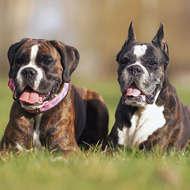"The government needs to work with vets and animal welfare charities to find a way to stop this abhorrent practice." Daniella Dos Santos, BVA senior vice president.
Association urges MPs and wider public to #CutTheCrop
The BVA has expressed concerns over a rise in cases of dogs with cropped ears being seen in practice and has called for immediate action to stop this worrying trend.
In a blog post, BVA senior vice president Daniella Dos Santos said: “In recent years, vets in the UK have seen a dramatic increase in the number of dogs with cropped ears, marking a frightening trend towards the normalisation of a mutilation that is horrific, unnecessary, and rightfully illegal in this country.”
The RSPCA has reported a 236 per cent increase in the number of reports of ear cropping received in the last five years, despite ear cropping being illegal in the UK.
Ms Dos Santos theorised that the increase in cases is either the result of cropped-ear dogs being imported from countries where it is still legal, or dogs bred in the UK being taken overseas specifically to have the procedure done.
The BVA has also been made aware of unscrupulous breeders carrying out ear cropping procedures illegally in the UK using crude instruments and likely without any anaesthesia or pain relief.
Ms Dos Santos concluded: “Ear cropping is illegal and it’s time for action to stop it happening in the UK. The government needs to work with vets and animal welfare charities to find an effective way to stop this abhorrent practice.
“We need to educate ourselves and each other. We have to stop normalising this mutilation. Celebrities who post pictures with their cropped dogs need to be called out for perpetuating the trade and told to #CutTheCrop.”
A petition which calls for a ban on the importation of dogs with cropped ears can be accessed here.
Under the RCVS Code of Professional Conduct, veterinary professionals can break client confidentiality and disclose information to the authorities where necessary.
Veterinary professionals concerned about seeing a case of ear cropping or illegal importation in practice should contact their local authority animal health and welfare team.








